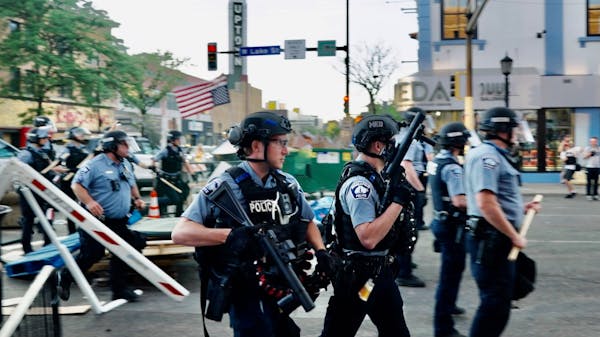Demonstrators and city leaders struggled Tuesday for control of one of Minneapolis' busiest streets, 12 days after the law enforcement killing of Winston Boogie Smith Jr. and two days after a protester was killed by a speeding driver.
Smith's death during an attempted arrest by U.S. marshals — who were not wearing body cameras — launched daily protests at the Uptown intersection of Lake Street and Girard Avenue.
Protester Deona Knajdek was killed in the zone Sunday when a driver collided with another car being used as a roadblock to prevent vehicles from driving into demonstrations in the middle of the street.
On Monday night and Tuesday morning, protesters succeeded in barricading graffitied streets with upturned lampposts, wooden pallets and construction signs. Trash bags heaped in alleys prevented traffic from entering the protest zone from the north and south.
Two dozen protesters "held space" in the barricaded zone Tuesday morning as city workers directed traffic around the area. Some cooked out near a makeshift memorial to Smith. Small groups of people chased away news crews attempting to report on the developing occupation.
Police arrived about 1 p.m. Tuesday and took away the roadblocks. Protesters sent out calls for reinforcements across social media. Dozens more people showed up as police finished clearing the streets, and they soon began to rebuild the barricades.
The area remained closed to traffic Tuesday afternoon. But Mayor Jacob Frey said the city would clear the roadway and said the city would not "abandon" Uptown.
At 8:30 p.m., law enforcement swarmed the intersection of Lake Street and Girard from the west and east, removing the barricades and arresting more than a dozen protesters. Later in the night, officers on foot and bicycle monitored the crowd.
Earlier, Emmett Williams, a local resident, complained about the barricades and trash with Uptown Smoke Shop manager Mohammed Hasan outside the tobacco shop. "I cannot lie," Williams said. "Not all police officers are evil." But law enforcement agencies need to weed out problem officers, he said.
"If you want to protest, let's all go together … I just feel this is more destruction than protest," said Hasan.
Another Uptown resident, Darren Luckett, said he was frustrated that the community had to pay the price for law enforcement's killing of another Black man under disputed circumstances.
"When we protest with anger, then our shops, our stores, our pharmacies pay the price. Our communities, is what it boils down to, pays the price for ignorance," he said.
Frey and City Council President Lisa Bender, who have clashed on the future of policing in Minneapolis, appeared together at a news conference Tuesday. Frey vowed police will break down the barricades each time they're rebuilt because he believes demonstrations have become more dangerous in recent days.
"As for tonight, we will have additional law enforcement resources that are in the area from our regional partners," he said. "We will make clear to offer a dispersal order if anything goes beyond peaceful protests. Following the dispersal order, we will give people time to leave, and if they don't, arrests will [happen]. Residents and workers from Uptown, they can't simply have the city abandon them."
Frey also declared that the Minneapolis Police Department will not participate in any joint law enforcement ventures in which agents are not wearing body cameras.
Members of the media said they did not hear a dispersal order before Tuesday's arrests. Independent photojournalist Louie Tran asked officers why one wasn't issued; a Hennepin County deputy told Tran he should ask Frey.
Bender reiterated the position she took, after George Floyd's murder last summer, that funding should be diverted from Minneapolis Police into social services and other crime prevention strategies. At the same time, she pointed out that speeding, car crashes and other traffic problems have long plagued Uptown.
"Everyone kind of wants safety, everyone in our community is united in wanting racial justice," she said.
Staff writer Kim Hyatt contributed to this report.
Susan Du • 612-673-4028

Want to share info with the Star Tribune? How to do it securely

'Safe recovery sites' would offer syringes, naloxone and more to people using drugs. The plan could be in peril.
New Minnesota GOP leaders seek peace with party's anti-establishment wing

Who is Republican Lisa Demuth, Minnesota's first House speaker of color?

